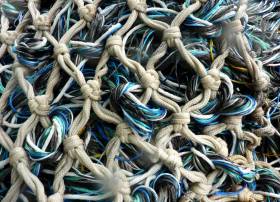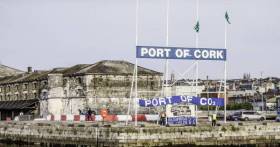Displaying items by tag: Extinction Rebellion
‘Bycatch Parade of Dead Sea Life’ in Dublin to Highlight Need for Ocean Protections
Extinction Rebellion is teaming up with other environmental groups to stage a ‘Bycatch Parade of Dead Sea Life’ through central Dublin tomorrow (Monday 11 October) to demand better protection for our oceans.
Members of Extinction Rebellion Ireland, the Irish Wildlife Trust, marine conservation group Sea Change and others will march with a mock fishing trawler dragging behind it a large net filled with skeletons of fish and marine life.
Characters dressed as fishermen and dead fish in skeletal masks and costumes will pull the boat while enacting the practice of discarding dead bycatch from bottom trawling in Irish waters.
The effect will be of a funeral procession for dead sea life, Extinction Rebellion says.
The protest begins at the Garden of Remembrance at 11.45am with the groups proceeding to the gates of Leinster House, arriving at 12.45pm.
Extinction Rebellion Ireland will also hold its national general meeting online this Thursday 14 October. Details are available on the event Facebook page.
Protest At Leinster House Highlights Concerns Over Future Of Ireland’s Commercial Fishing
Campaigners assembled at the gates of Leinster House yesterday to call for an end to overfishing in Ireland’s waters.
As RTÉ News reports, the Extinction Rebellion movement teamed up with the Irish Wildlife Trust for the demonstration, which featured two protesters in mermaid costume reading out a list of fish stocks that have been depleted in the waters around our coasts.
The campaign argues that Marine Minister Michael Creed has failed to take action to ensure sustainable fishing here — which will lead to dramatic cuts in quotas for the Irish fishing fleet, they say.
Minister Creed heads to Brussels next Monday (16 December) for the EU Agriculture and Fisheries Council, which will decided quotas for the next year.
Campaigners Extinction Rebellion Targets Port of Cork Demanding Action on Climate Change
Campaigners for the environment, Extinction Rebellion have targeted the Port of Cork in their latest protest.
According to EchoLive.ie, signs emblazoned with slogans such as "Port of CO2" and "Business as Usual??" were attached to the Port of Cork sign at Custom House Quay.
The group said the action was carried out in a non-violent and non-destructive way.
Extinction Rebellion is an environmental movement aiming to draw public and government attention to the need to tackle climate change.
In April and July, the group staged ‘die-in’ protests, on Oliver Plunkett Street and outside City Hall, where participants symbolically played dead to mimic an apocalypse.
The protest group is adamant that radical action must be taken to immediately halt biodiversity loss and reduce greenhouse gas emissions to net zero by 2030.
Click here for more on the story.






























































